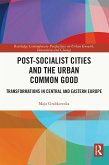Comparing cities, contexts, and the achievements of the squatters' movements, this book presents the view that squatting is not simply a set of isolated, illegal and marginal practices, but is a long-lasting urban and transnational movement with significant and broad implications. While intersecting with different housing struggles, squatters face various aspects of urban politics and enhance the content of the movements claiming for a 'right to the city.' Squatters in the Capitalist City seeks to understand both the socio-spatial and political conditions favourable to the emergence and development of squatting, and the nature of the interactions between squatters, authorities and property owners by discussing the trajectory, features and limitations of squatting as a potential radicalisation of urban democracy.
Dieser Download kann aus rechtlichen Gründen nur mit Rechnungsadresse in A, B, BG, CY, CZ, D, DK, EW, E, FIN, F, GR, HR, H, IRL, I, LT, L, LR, M, NL, PL, P, R, S, SLO, SK ausgeliefert werden.
Susan S. Fainstein, Senior Research Fellow, Harvard University Graduate School of Design, USA, Author of The Just City
"Squatting empty buildings has been for decades a self-organized policy to ensure the right to adequate housing for those excluded both from the residential markets and the bureaucratic and exclusionary webs of housing policies. This book is an essential road map to understand squatting in Europe, in its diversity and complexity."
Raquel Rolnik, Professor of Planning at the University of São Paulo, Brazil, Author of Urban Warfare: Housing Under the Threat of Finance
"Squatting is a reality-in almost every country in the world. Miguel A. Martínez shows it's about more than a roof over their heads. Squatting is the best housing policy-because they almost everywhere point out and enforce alternatives to organize housing beyond the capitalist exploitation logic."
Andrej Holm, Department of Urban and Regional Sociology of Humboldt Universität zu Berlin, Germany, Co-editor of The Berlin Reader: A Compendium on Urban Change and Activism
"The most comprehensive analysis of European urban squatters' movements ever written. By examining a remarkable range of cases across Europe, the author reveals the surprising diversity within and between these movements, and the political opportunities and constraints that shaped squatters' interactions with their numerous opponents. A beautifully written example of scholar-activism by one of its most important voices."
Tom Slater, University of Edinburgh, Scotland, Co-editor of The Sociology of Stigma
"The book, lavishly illustrated with images, all taken by the author, which complement the text and bring the reader closer to the sites of the events, invites the reader to a fascinating read that deals with the questions: is squatting a social movement, and, by the way, what is a social movement? This book must be read by scholars and activists interested on the topic of squatting and in general those interested in urban movements of resistance against neoliberalism."
Irene Molina, Radical Housing Journal
"A timely contribution to the literature, Squatters in the Capitalist City will no doubt help academics and activists better understand the internal dynamics of squatter movements, as well as the throughlines that connect local struggles for more just conditions throughout the globe."
Jenna Davis, Journal of Urban Affairs
"The author combines a critical re-reading of scholarship on squatting and squatters with a unique 20-year engagement with qualitative research and a vast, and often collaborative, publication trajectory. The result is a rich volume, firmly positioned within the canon of European sociological approaches to squatting rooted in social movement theory....In the current landscape of heightened urban displacement, tighter border regimes and the rise of right-wing politics, the book offers a powerful--and hopeful--reminder of the transversal and plural histories of radical struggle for autonomous urban spaces."
Mara Ferreri, Northumbria University, for the International Journal of Urban and Regional Research
"By combining a critical perspective on well-established theoretical formulations and recent studies, with abundant empirical evidence, this work critically contributes to studies in the field. In addition to providing a rich source of information for readers willing to further investigate, this book is certainly a solid basis for discussions, with the potential to spark debate even outside academic circles."
Clarissa Campos, Adjunct Professor, Federal University of Sao Joao del-Rei, for the International Journal of Housing Policy









